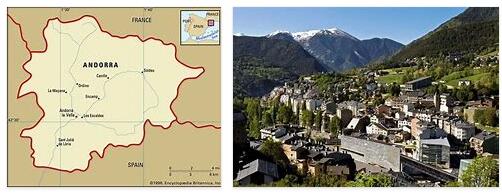Andorra, officially Catalan Principality of Andorra, French Principauté d’Andorra [prε sipo te dã d ɔ r], German principality of Andorra, a small state in the eastern Pyrenees with (2018) 77 000 residents; The capital is Andorra la Vella.
Politics
According to the constitution of May 4, 1993, Andorra is a sovereign parliamentary principality. The new constitution replaced the feudal rulership structures going back to the Paréage Treaty of 1278 (Paréage), according to which Andorra was a condominium under the patronage of two co-princes (Coprínceps), the French president (legal successor to the Count of Foix) and the Spanish bishop of Urgell (seat: Seu d’Urgell) stand. The two co-princes remain heads of state with a purely representative function; They have the right to veto certain contracts with France and Spain. As a legislature The General Council, elected for 4 years, functions (currently 28 members, 50% each are elected in the municipalities and at the national level according to proportional representation), which elects the head of the government (executive council). This in turn appoints the ministers. Constitutional amendments require a referendum and a two-thirds majority in parliament.
National symbols
The national flag is divided vertically into blue-gold-red and bears the coat of arms in the middle of the golden stripe.
The coat of arms is quartered and symbolizes the constitutional status of the principality. The heraldic right half refers to the patronage of the Bishop of Urgell through the miter and shepherd’s staff as well as the four red stakes of Catalonia on a golden background, the left to the French President as heir to the counties of Foix (three red stakes on a golden background) and Béarn (two red cows on a golden background). The motto under the coat of arms is: »virtus unita fortior« (some strength is stronger).
The national holiday on September 8th commemorates the achievement of independence in 1278 (Paréage Treaty); March 14th is Constitution Day (1993).
Parties
The 1993 constitution laid the foundations for the legal existence of parties. The most important parties are the Demòcrates per Andorra (DA, German Democrats for Andorra), the Liberals d’Andorra (L, German Liberale Andorra), the Partit Socialdemòcrata (PS, German Social Democratic Party) and the grouping Socialdemocràcia i Progrés (SDP, German Social Democracy and Progress).
Unions
The 1993 constitution also created the right to form trade unions. The Unió Sindical d’Andorra (USd’A, founded 2001) is a member of the European Trade Union Confederation.
Military
There is no conscription. Andorra is defended by France and Spain. The border and customs surveillance is under the control of French and Spanish officials.
Administration
In addition to the capital, Andorra is divided into 6 municipal districts (Parròquies), which are headed by local councils.
Law
Jurisdiction is exercised by the Batlles (judges of first instance), the Tribunal de Batlles (court of first instance), the Tribunal de Corts (appeals and jury courts) and the Tribunal Superior de Justícia (Supreme Court). There is also a constitutional court. The legal system is based on statutory law and customary law and is partly shaped by European law influences.
Education
According to andyeducation, the education system comprises an Andorran system (the language of instruction is Catalan), a Spanish and a French system, as well as denominational schools and an English-speaking private school. There is general compulsory education from 6 to 16 years of age. In addition to the institutions for general and vocational or specialist training, the University of Andorra has existed since 1997.
Media
Press: The daily newspapers El Periòdic d’Andorra, Diari d’Andorra and Bon Día appear in Catalan.
Broadcasting: The national broadcaster Ràdio i Televisió d’Andorra (RTVA) broadcasts a television and a radio program (ATV or RNA). There are also several private radio stations.
